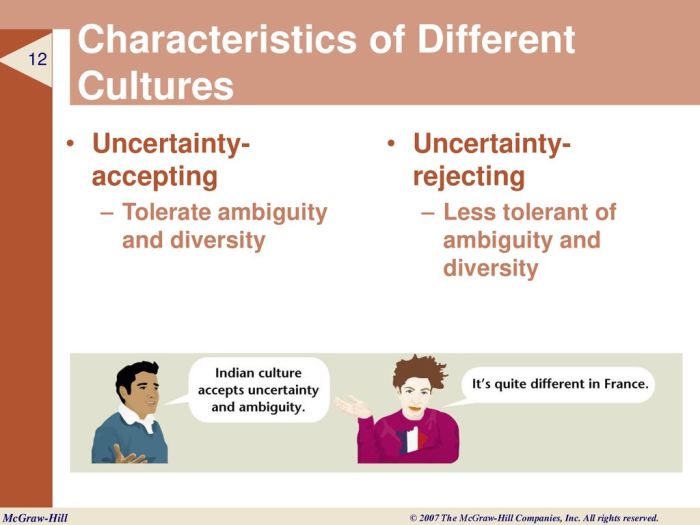Which type of culture tolerates ambiguity and uncertainty? This question sparks an intriguing inquiry into the diverse ways cultures navigate the complexities of the unknown. From societies that embrace uncertainty to those that strive for clarity, this exploration delves into the factors shaping cultural tolerance for ambiguity and its implications for individuals and organizations.
Cultures vary in their values, beliefs, and practices, leading to distinct approaches towards ambiguity and uncertainty. Some cultures foster a high tolerance for ambiguity, allowing individuals to adapt and thrive in unpredictable environments. Others prioritize certainty, seeking to minimize ambiguity through structured systems and clear expectations.
Types of Cultures

Cultures around the world exhibit a wide range of diversity in their values, beliefs, and practices. These differences can significantly impact how individuals perceive and respond to ambiguity and uncertainty.
Some cultures emphasize conformity and predictability, while others embrace flexibility and adaptability. Cultures that value individualism may encourage individuals to take risks and seek out new experiences, while collectivist cultures may prioritize group harmony and stability.
Cultural Tolerance for Ambiguity and Uncertainty
Ambiguity and uncertainty refer to situations where there is a lack of clarity or predictability. Cultures that tolerate ambiguity and uncertainty are more comfortable with open-endedness and change, while those that are intolerant may experience anxiety and discomfort in such situations.
Examples of cultures with high tolerance for ambiguity and uncertainty include the Netherlands, Denmark, and Sweden. These cultures are known for their flexible social norms, open-mindedness, and willingness to embrace new ideas.
Cultural Mechanisms for Coping with Ambiguity and Uncertainty, Which type of culture tolerates ambiguity and uncertainty
Cultures develop various mechanisms to cope with ambiguity and uncertainty. These mechanisms can include:
- Cognitive appraisal:Individuals evaluate the situation and assess its potential threats and opportunities.
- Emotion regulation:Individuals use strategies to manage their emotional responses to uncertainty, such as seeking support or engaging in relaxation techniques.
- Social support:Individuals turn to family, friends, or community members for guidance and emotional support.
- Rituals and ceremonies:Cultural practices can provide a sense of structure and predictability in uncertain times.
Cross-Cultural Differences in Tolerance for Ambiguity and Uncertainty
Cross-cultural research has shown significant differences in tolerance for ambiguity and uncertainty across cultures. For example, studies have found that:
- Individualistic cultures tend to have higher tolerance for ambiguity and uncertainty than collectivist cultures.
- Cultures with a high level of economic development tend to have higher tolerance for ambiguity and uncertainty than those with a low level of economic development.
Implications for Individuals and Organizations
Cultural tolerance for ambiguity and uncertainty can have a significant impact on individuals’ behavior and decision-making. Individuals from cultures with high tolerance for ambiguity and uncertainty may be more likely to:
- Take risks and explore new opportunities.
- Be open to change and adapt to new situations.
- Tolerate disagreement and ambiguity.
Organizations operating in a globalized world need to be aware of cultural differences in tolerance for ambiguity and uncertainty. This awareness can help them:
- Adapt their communication and management styles to different cultural contexts.
- Avoid misunderstandings and conflict.
- Create inclusive and supportive work environments for employees from diverse cultural backgrounds.
Detailed FAQs: Which Type Of Culture Tolerates Ambiguity And Uncertainty
What is ambiguity tolerance?
Ambiguity tolerance refers to an individual’s or culture’s ability to accept and navigate situations with incomplete or uncertain information.
How does cultural tolerance for ambiguity impact decision-making?
Cultures with high ambiguity tolerance tend to make decisions based on a broader range of information, while cultures with low ambiguity tolerance prioritize clear and structured decision-making processes.
Can individuals adapt to cultures with different levels of ambiguity tolerance?
Yes, individuals can develop strategies to adapt to different cultural norms, including adjusting their communication styles and expectations.

